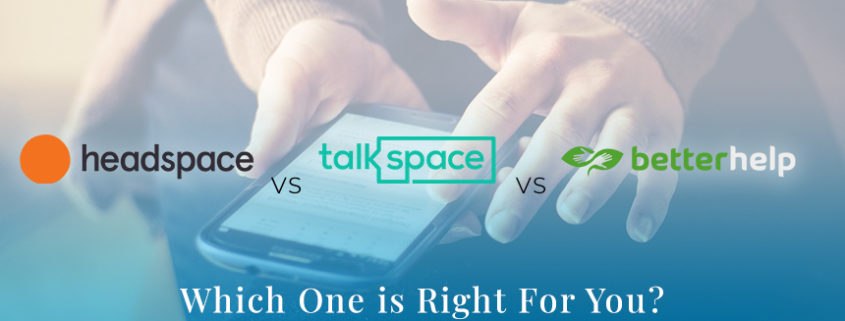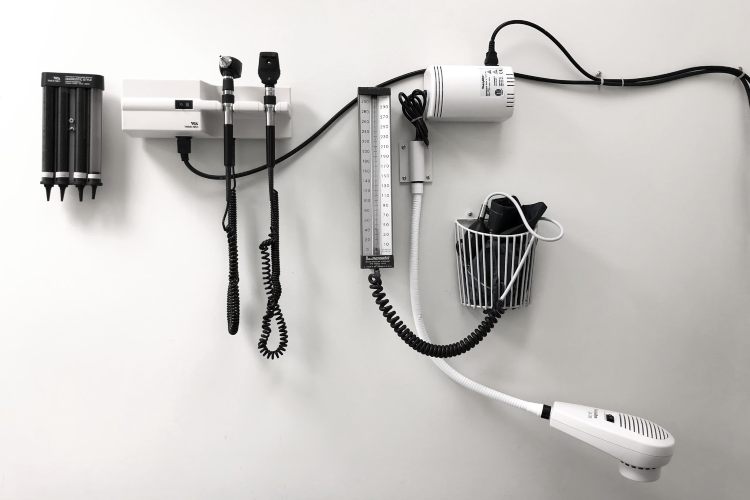Talkspace vs Headspace vs BetterHelp
There are over 1,000 mental health apps available to smartphone users.
These apps cover a broad scope, touching on everything from therapy with a live counselor to guided meditations. Some of the apps connect users to licensed therapists, while others are personally-oriented and don’t offer access to medical professionals.
Having these apps as supplements, tools, and guides is a fantastic option, but it’s worth noting that only about 14% of them include evidence such as clinical research. Doing your own research before downloading and using is a wise idea.
That’s likely why you landed here, where we compare Talkspace, Headspace, and BetterHelp — three of the more notable offerings. If you’re curious, keep reading for an honest look at the pros and cons of each.
Talkspace
First on our list is Talkspace, the #1-rated online therapy app that boasts over one million users.
Talkspace attempts to take the place of an in-person therapist. Users take a brief assessment, which pairs them with a list of recommended therapists. If you end up choosing one, you’ll begin a therapy journey with that counselor.
Here’s what you need to know.
Pros
Talkspace provides 24-hour access seven days a week. Often, a person can’t predict when they’ll genuinely need a conversation with their therapist. Talkspace provides access when you need it.
If you begin your journey with one therapist and find the connection isn’t working for you, you can switch—at no extra cost. Additionally, Talkspace has several plans that fit a wide range of budgets.
Talkspace also specializes in treating teens (13-17) or couples.
Cons
Unfortunately, many things can be missed when one does therapy over the phone—even slight behavioral changes that are noticeable in-person.
Humans are nuanced creatures, and diagnosing someone virtually may prove to be more difficult for severe mental health disorders.
Headspace
Headspace is a guided app that covers a different part of mental health: meditation.
If you find meditation challenging to do on your own, Headspace makes the practice easier and more rewarding. It aims to help its users be “less stressed,” “more resilient,” and happier.
We talk about its advantages and negatives below.
Pros
Headspace can be done for minutes at a time, offering users a world of convenience. Perhaps you arrived to work five minutes early, you’re sitting in your car in the driveway after a long day, or you’re about to make a major decision. Simply pull out your phone and allow yourself that brief but meaningful escapism.
Headspace also covers a wide range of topics, allowing users to find something specific to their current needs. Maybe you want to learn more about mindful eating, how to sleep better, or wish to cultivate a more mindful office space.
Headspace talks about all these subjects and more.
Cons
While Headspace does provide its users with a handful of free meditations, it’s likely you’ll soon want to upgrade.
The free ones tend to be shorter in length and are limited, meaning you can make your way through the entire selection—ten sessions—quickly.
Headspace is a wonderful supplement to your regular mental health routine. Still, those with more serious disorders will need something besides the app, such as a program, to care for themselves adequately.
BetterHelp
Finally, we have BetterHelp — another app like Talkspace that connects its users with licensed therapists that offer counseling sessions.
BetterHelp also specializes in individual therapy, couple’s therapy, and therapy with teenagers.
Pros
BetterHelp allows users to connect with their therapist in several ways. One can communicate over the phone, through video, or through messaging or chat options. This feature lets you choose a preference that’s most comfortable for you.
Additionally, BetterHelp doesn’t require the use of appointments. One can message their therapist at any time, and from there, schedule a live session at the next convenient moment.
Cons
While you can message your therapist at any time, that doesn’t mean there’s a specific time when you’ll hear back. This point can leave some users feeling dejected.
While you can switch therapists if you find your match doesn’t quite fit, BetterHelp encourages its users not to choose their own.
Rather, BetterHelp wants to connect you with a therapist of its choice based on answers you provide to a questionnaire. Again, like Talkspace, this process may feel a little impersonal to some. It may also cause the app or its therapists to miss something that could be important to your mental health journey.
Finally, the cost of BetterHelp is about the same cost as a traditional, in-person therapist.
Of course, you won’t have the convenience of speaking to them from the comfort of home (or elsewhere)—but some see that as a reason to have reduced costs. Expect to pay anywhere from $60 to $90 per session with BetterHelp, or $240 to $360 a month if you do weekly sessions.
Are These Mental Health Apps Right for You?
Having options is a good thing. It allows you to work with individual apps or use two or more in tandem.
Perhaps you find you enjoy using Talkspace to speak with a therapist, followed by a quick guided meditation on Headspace. Or, maybe BetterHelp is enough for you.
Either way, we hope this article provided you with transparent insight into each of these apps. At Solara Mental Health, we care about providing honest information and compassionate help. Our priority is you.
Click here to learn about our own programs, which provide anything from screenings and assessments to family programs or 24-hour, in-person programs. We look forward to hearing from you.





